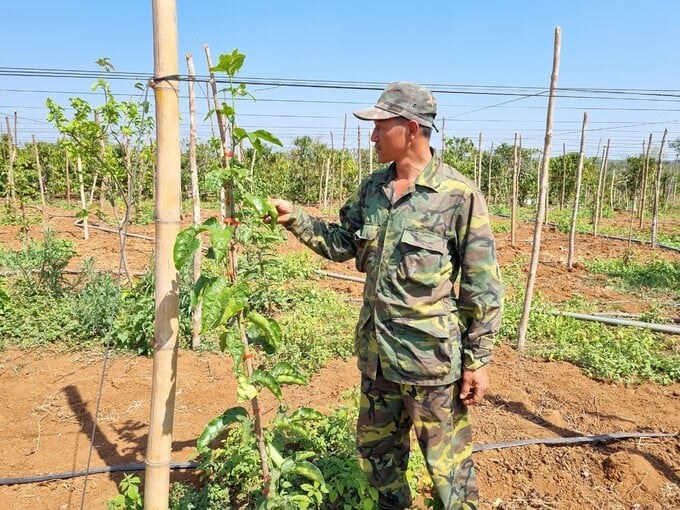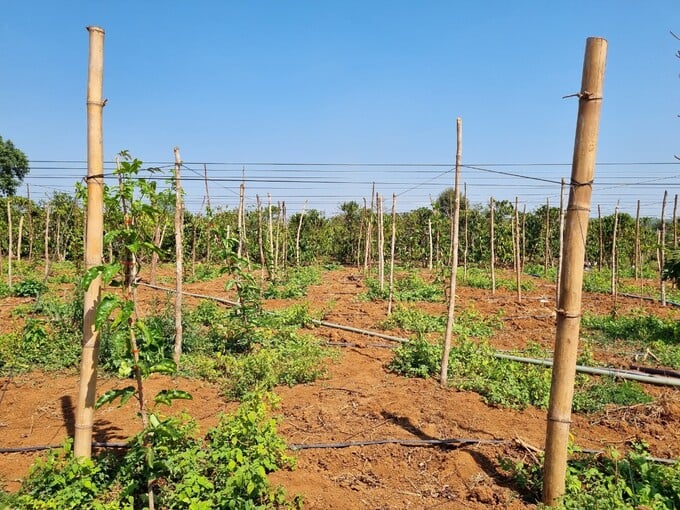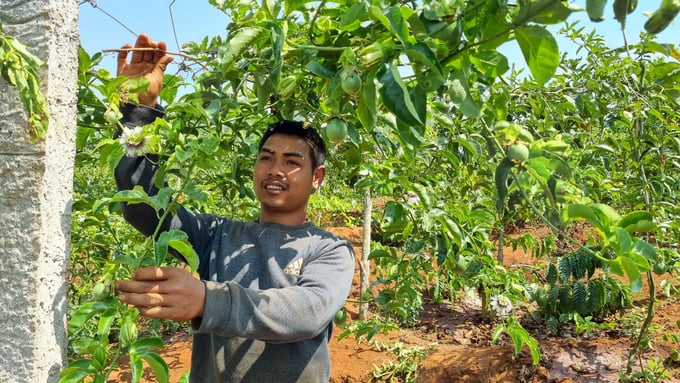June 17, 2025 | 18:42 GMT +7
June 17, 2025 | 18:42 GMT +7
Hotline: 0913.378.918
June 17, 2025 | 18:42 GMT +7
Hotline: 0913.378.918

Many coffee gardens have been replaced with passion fruit. Photo: Tuan Anh.
Facing the attraction from the profit that passion fruit trees bring, many households in Gia Lai are massively destroying old, low-yielding coffee to convert crops.
Chu Pah district (Gia Lai province) is one of the localities with the largest area of passion fruit trees in Gia Lai province. From a few dozen hectares in the years 2016-2017, up to now, the area of passion fruit has increased to more than 500 hectares, of which 400 hectares are intercropped in coffee gardens, 100 hectares are planted purely.
In Ia Mo Nong commune (Chu Pah district), previously, the concrete roads running into the production area of the people with thousands of coffee trees are now gradually covered with fruit-laden passion fruit gardens. At the time the reporter noted, a series of old, low-yielding coffee gardens were cut down by people to prepare for sowing passion fruit.
Perhaps, people see the immediate benefit when investing a hectare of passion fruit costs about VND 150 million, and within a year will earn about VND 500 million. While the price of passion fruit has always been high and stable for many years, making many people more and more stimulated to invest in planting. Since then, coffee gardens have been mercilessly cut down to be replaced by passion fruit.
Mrs. Tran Thi Minh (Mon village, Ia Mo Nong commune) said that many households in this area rushed to grow passion fruit because of the past time, the mass media always informed about the export of passion fruit, durian very good, high price. On the other hand, growing passion fruit only takes about 6 months to harvest, so many households are dragged late.

Passion fruit gives high profits, so people simultaneously destroy old coffee. Photo: Tuan Anh.
The story of dismantling passion fruit coffee is also happening at the same time in Dak Doa, Mang Yang, Ia Grai districts... Mr. Ngo Van Doanh (Linh Nham village, Dak Djrang commune) decided to demolish the garden in the Mang Yang district. 1.4ha coffee to grow passion fruit from the beginning of 2022. So far, he has collected 3 batches of nearly 60 tons, selling for VND 14,000 - 17,000 /kg. This year, he continues to plant 6 more passion fruit trees in the old coffee area.
Mr. Vo Minh Quang, Head of the Department of Agriculture and Rural Development of Mang Yang district, said that many old coffee areas in the area had been converted to passion fruit by people. If in 2022, the district has 382ha of passion fruit, then in the first 3 months of this year, 4 communes reported an increase of 105ha. Households plant passion fruit in a 2-year cycle, replanting coffee trees in the 3rd year.
The price of passion fruit at the moment is about VND 14.000/kg, on average 1 hectare of passion fruit grows 40 tons. The profit will be from VND 350-400 million/ha. While the same area is planted with coffee, with the current price (VND 46,000/kg), the profit is only from VND 100 to 120 million. Many households are determined to destroy their coffee gardens after many years of attachment because of the profit attraction from passion fruit trees.
Mr. Pham Duc Phuong (village 2, Ia Ka commune, Chu Pah district) said that his family has 1ha of coffee planted since 1999, but now the garden is old and has low yield, so he decided to cut it down to save money for growing passion fruit. “The passion fruit garden is expected to be harvested in October this year. The price is about VND 14,000/kg. If the price remains stable in the upcoming time, the family will earn a great profit. This tree has high economic value and good output, so I plan to expand the area," Mr. Phuong shared.

Huyk's family's life is improved by growing passion fruit. Photo: Tuan Anh.
According to Mr. Nguyen Kim Anh, Head of the Department of Agriculture and Rural Development of Dak Doa district, since passion fruit was allowed to be imported officially by China, some businesses in the district have focused on completing the procedures to be granted growing area code as well as the packing facility. The price of passion fruit in recent years has been very stable, so people in the district have made the most of the coffee replanting area to intercrop passion fruit trees.
In addition, the areas no longer suitable for pepper plants are also used by people to switch to growing passion fruit. Passion fruit trees are suitable for the local climate and soil, so they have a high yield, averaging about 40 tons/ha. Compared to some other crops, passion fruit gives a high income, and many households are also getting rich from this crop. Therefore, people do not abandon coffee to switch to passion fruit but make the most of the time to improve the soil to rotate short-term crops.
After growing passion fruit for 1-2 years, people started intercropping with replanted coffee trees to be more stable. This model is developing strongly in the district, with the area of passion fruit growing in the district over 650ha, an increase of about 100ha compared to last year.
Mr. Nguyen Kim Anh, Head of the Department of Agriculture and Rural Development of Dak Doa district, said that the district identified passion fruit as one of the suitable trees and for the development of the local staple crop. However, from the industry's perspective, the district focuses on developing passion fruit trees that do not follow market prices. Still, orient people to produce sustainably, with close production links. Because many areas of passion fruit are at the time of basic construction, dealers compete to buy and choose good fruits for export.
Translated by Ha Phuc
/2025/06/17/2013-1-nongnghiep-112009.jpg)
(VAN) This notable growth trend reflects the global taste for fresh, nutritious fruits and the expanding use of lychees across various sectors.

(VAN) The political and cultural insulation of Japan’s beloved grain is falling apart, and experts warn the country’s relationship with the staple will have to adapt.

(VAN) Noting risks, report examines impacts of avian influenza, changing trade patterns since 2022, fish fraud, and shipping industry’s net-zero goals.

(VAN) Mr. Tran Quang Bao, General Director of the Forestry and Forest Protection Department, met and worked with the International Wood Products Association to promote cooperation in the field of timber trade.

(VAN) China's outbound shipments of rare earths in May jumped 23% on the month to their highest in a year, though Beijing's export curbs on some of the critical minerals halted some overseas sales.

(VAN) To sustain capital flow, administrative reform alone is not enough; what farmers truly need is an ecosystem where both government and businesses grow together in support.

(VAN) Vietnam and the United States are proactively working together, each in their own way, to ensure that every container of agricultural goods carries not just products, but also long-term trust and value.